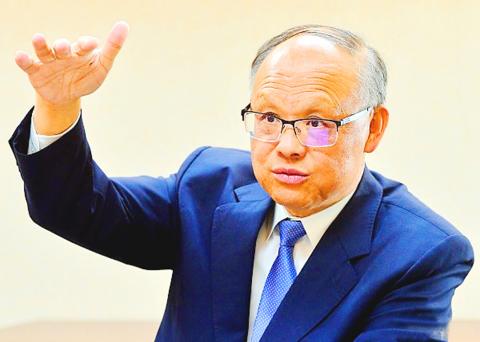Minister Without Portfolio John Deng (鄧振中), head of the Office of Trade Negotiations, on Tuesday said that the government would continue to improve ties with Japan and would not give up on seeking support for its bid to join the Comprehensive and Progressive Agreement for Trans-Pacific Partnership (CPTPP).
Deng made the remarks on the sidelines of a ceremony in Taipei to celebrate Japanese Emperor Akihito’s 85th birthday on Dec. 23, where Japanese Representative to Taiwan Mikio Numata said that despite Tokyo finding the results of the Nov. 24 referendum on a ban on some Japanese food imports “rather regrettable,” it would continue to collaborate with Taipei to create a bright future for both nations.
Numata’s comments represented a minor departure from the response to the referendum of Japanese Minister of Foreign Affairs Taro Kono, who said that the results have rendered Taiwan’s chance of joining the CPTPP unlikely and that Tokyo did not rule out taking the issue to the WTO.

Photo: Wang Yi-sung Taipei Times
The referendum, initiated by the Chinese Nationalist Party (KMT), asked: “Do you agree that the government should, in connection to the March 11 Fukushima Dai-ichi nuclear disaster, continue to enforce the food imports ban on 31 regions in Japan, including agricultural and food products from Fukushima and the surrounding four prefectures and municipalities (Ibaraki, Tochigi, Gunma and Chiba)?”
About 78 percent of the nearly 10 million voters who voted on the question voted “yes.”
Asked how the government now plans to further its CPTP after the referendum, Deng said that the government would not give up its efforts to join the CPTPP and that it would seek to improve its relations with Japan through other means, without elaborating further.
Acknowledging his disappointment with the result, Deng said that the referendum question was clearly leading, as it did not include the terms “radioactive” and “contaminated,” and failed to reflect the truth, which is that there is no way for food products contaminated with radioactivity to enter Taiwan.
“No government in the world would feed their people contaminated food,” Deng said, adding that products imported into the nation need to go through three to four examinations before they are permitted entry.
Deng said that he also has concerns over the attitude of some Taiwanese, whom he said have “taken pleasure” in the problems the referendum result has caused the Democratic Progressive Party administration.
Regardless of their political affiliation, people should refrain from adopting such a triumphal attitude when it comes to international affairs, Deng said, adding that Taiwan should send consistent signals to the international community that it is a supporter of free trade.

MAKING WAVES: China’s maritime militia could become a nontraditional threat in war, clogging up shipping lanes to prevent US or Japanese intervention, a report said About 1,900 Chinese ships flying flags of convenience and fishing vessels that participated in China’s military exercises around Taiwan last month and in January last year have been listed for monitoring, Coast Guard Administration (CGA) Deputy Director-General Hsieh Ching-chin (謝慶欽) said yesterday. Following amendments to the Commercial Port Act (商港法) and the Law of Ships (船舶法) last month, the CGA can designate possible berthing areas or deny ports of call for vessels suspected of loitering around areas where undersea cables can be accessed, Oceans Affairs Council Minister Kuan Bi-ling (管碧玲) said. The list of suspected ships, originally 300, had risen to about

DAREDEVIL: Honnold said it had always been a dream of his to climb Taipei 101, while a Netflix producer said the skyscraper was ‘a real icon of this country’ US climber Alex Honnold yesterday took on Taiwan’s tallest building, becoming the first person to scale Taipei 101 without a rope, harness or safety net. Hundreds of spectators gathered at the base of the 101-story skyscraper to watch Honnold, 40, embark on his daredevil feat, which was also broadcast live on Netflix. Dressed in a red T-shirt and yellow custom-made climbing shoes, Honnold swiftly moved up the southeast face of the glass and steel building. At one point, he stepped onto a platform midway up to wave down at fans and onlookers who were taking photos. People watching from inside

Japan’s strategic alliance with the US would collapse if Tokyo were to turn away from a conflict in Taiwan, Japanese Prime Minister Sanae Takaichi said yesterday, but distanced herself from previous comments that suggested a possible military response in such an event. Takaichi expressed her latest views on a nationally broadcast TV program late on Monday, where an opposition party leader criticized her for igniting tensions with China with the earlier remarks. Ties between Japan and China have sunk to the worst level in years after Takaichi said in November that a hypothetical Chinese attack on Taiwan could bring about a Japanese

The WHO ignored early COVID-19 warnings from Taiwan, US Deputy Secretary of Health and Human Services Jim O’Neill said on Friday, as part of justification for Washington withdrawing from the global health body. US Secretary of State Marco Rubio on Thursday said that the US was pulling out of the UN agency, as it failed to fulfill its responsibilities during the COVID-19 pandemic. The WHO “ignored early COVID warnings from Taiwan in 2019 by pretending Taiwan did not exist, O’Neill wrote on X on Friday, Taiwan time. “It ignored rigorous science and promoted lockdowns.” The US will “continue international coordination on infectious